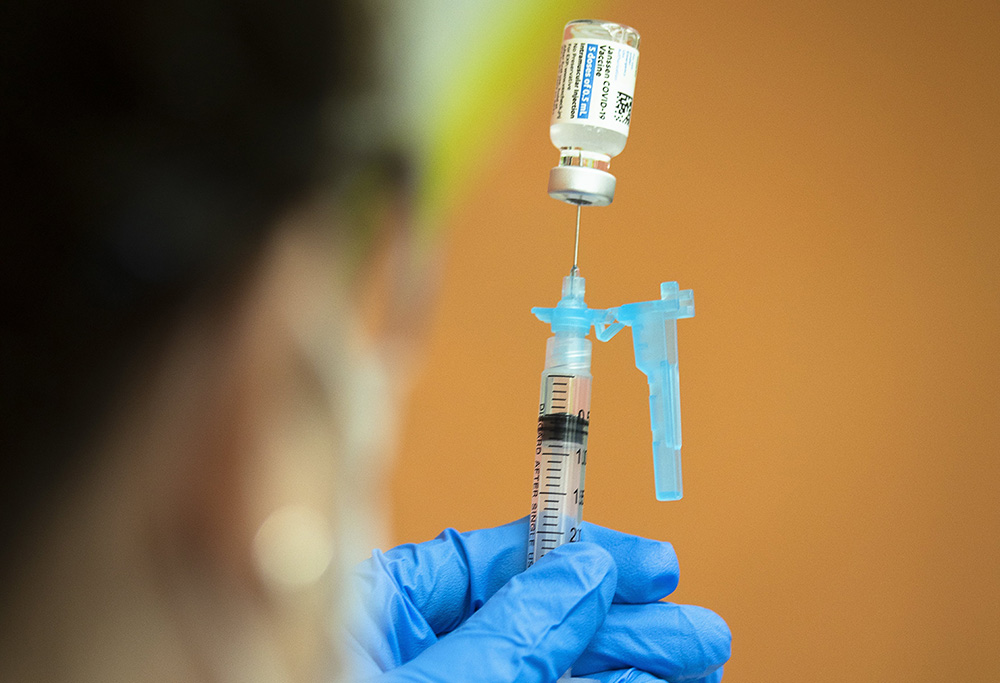
A health care worker at Catholic Charities in Washington prepares to administer the Johnson & Johnson COVID-19 vaccine May 18. (CNS/Tyler Orsburn)
While the eyes of the world will be attuned to the various races and contests at the Tokyo Olympics this month, a more consequential race is going on here in the United States: This race pits getting people vaccinated against COVID-19 versus the virus' ability to mutate into variants, some of which may diminish the effectiveness of the vaccines currently available.
Everyone has a moral obligation to get vaccinated unless they have a legitimate medical condition prohibiting them from doing so. It is not even a close call. COVID-19 remains a public health menace. It has killed more than half a million of our fellow citizens and required the closure of large parts of our economy for long periods of time. The thought of a new variant becoming resistant to the vaccines and the country being forced again into lockdown is difficult to even bear.
"Unvaccinated people are potential variant factories," Dr. William Schaffner, a professor in the Division of Infectious Diseases at Vanderbilt University Medical Center, recently told CNN. "The more unvaccinated people there are, the more opportunities for the virus to multiply."
Against such weighty moral and medical concerns, it is shocking that so many millions of Americans still resist getting vaccinated. Shocking, but not surprising. The amen corner of the Republican Party — Fox News host Tucker Carlson, Trumpian wannabees and, sadly, some Catholic clergy — somehow think not getting vaccinated is a sign of toughness. How did a fight against a virus become a battle in the culture wars?
For example, Bishop Thomas Paprocki of Springfield, Illinois, published a churlish letter scolding the University of Notre Dame for requiring its faculty, staff and students to be vaccinated before returning to campus. He insisted that vaccination "must be voluntary." Does the bishop have difficulty understanding the "public" or the "health" in the words "public health"?
We admit we would be troubled if the government were to require vaccines. The legal concern for bodily integrity is rooted in the prohibition against committing battery against another person, and that goes back pretty far in our common law inheritance.
Government regulations require employers to consider exemptions from required vaccination policies in the case of medical disability or "a sincerely held religious belief, practice or observance." And Notre Dame, for example, provides such consideration to students who object to vaccination for those reasons.
Advertisement
There is a larger moral burden on everyone to do what it takes to avoid infecting others. In almost all cases, that simply means getting vaccinated. Accommodations provided to those who choose not to be vaccinated must not endanger their co-workers or fellow students.
Colleges and universities — and health clubs and restaurants and a host of other private organizations — make all sorts of demands upon those who wish to participate. Smoking can be banned, particular attire required, special schedules maintained, and a certain grade point average mandated.
If the president of a university decides it is appropriate to require all faculty, staff and students to be vaccinated, we applaud that decision. If a president decides not to require vaccination, as some have, we encourage the board of trustees to raise objections. Universities exist to banish obscurantism, not to enlarge it.
The pro-life witness of the Catholic Church on the necessity of getting vaccinated should not be limited to our colleges and universities. Parochial schools should consider requiring vaccination, too. The U.S. Conference of Catholic Bishops should ask all pastors to preach, and preach repeatedly, on the moral necessity of getting vaccinated.
According to the Centers for Disease Control and Prevention, the unvaccinated are now virtually the only people in the United States dying from the virus. Self-interest counsels getting vaccinated. More than that, it is the health of the public, the good of our society and our civilization, that requires we attain herd immunity before the winter sets in and the rate of infection begins to go up.
We recognize that certain segments of the population have sound historical reasons for being suspicious of the medical community, especially when it is aligned with the government. The qualms of already marginalized groups, such as Black Americans and those who are physically or intellectually disabled, are real. Those qualms, however, do not amount to a reason to avoid vaccination.
If a church or a company or a community has someone who does not want to get vaccinated for such reasons, the obligation is not to suspend the requirements for them. It is to demonstrate solidarity, to empathize and understand, and to accompany them as they stand in line to get the vaccine.
Getting vaccinated is not only a way to protect oneself but to protect us all. If ever there was a moral obligation, this is it.






